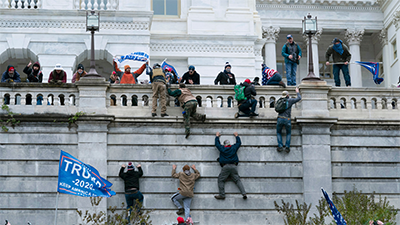|
Senate Again Absolves Trump in Impeachment Trial
February 14, 2021
Former President Donald Trump has avoided conviction again, after twice being impeached. The U.S. Senate voted 57–43 in favor of conviction; however, the Constitution requires a two-thirds majority of those present and all 100 Senators were present so the intended target of 67 was not reached. Trump, who became the third President ever to be impeached in late 2019, was acquitted in early 2020. He was then impeached a second time a few weeks ago. The first time around, the House filed two Articles of impeachment against Trump, one alleging abuse of power (in connection with the withholding of foreign aid to Ukraine in exchange for a political investigation) and the other refusing to comply with House subpoenas for information and/or testimony in connection with the impeachment investigation. On both of those Articles, the Senate voted to acquit Trump. The U.S. President is generally immune from prosecution while in office. Impeachment is the exception to this. The second impeachment featured one Article, that of inciting political violence. On Jan. 6, 2021, members of Congress were gathered at the U.S. Capitol to certify the results of the votes of the Electoral College, which officially recognized the victory of Joe Biden in the 2020 presidential election. Trump gave a speech in Washington, D.C., on that day, urging his supporters to continue to contest the results of the election–as he and they had been doing for weeks–and then many in the crowd marched to the Capitol and bypassed security, in the process killing six people and doing large amounts of damage. Members of Congress, fearing for their lives, barricaded the doors and hid in the Senate chamber. During the second impeachment trial, members of the U.S. House of Representatives, acting as prosecutors, presented evidence to support the Article of Impeachment, including large amounts of video showing the depth of the devastation inside the Capitol and the spoken acknowledgment of many of those who took part in the violence that they believed that Trump had told them to do it. In their rebuttal, the former President's lawyers challenged the legitimacy of prosecuting a President who was no longer in office. (Trump's term ended on Jan. 20, when Biden took over.) That was the technicality cited by Republican Senate leader Mitch McConnell when he voted not to convict Trump. He was joined by 42 other Republicans in voting not guilty. All 50 Democratic Senators voted to convict, and seven Republican Senators joined them. What Congress will do next regarding Trump and his actions during those weeks between the November election and the January certification is unclear. If the Senate had voted to convict the former President, the Senate could have taken the extra step of voting to bar him from holding public office again; that vote would have needed a simple majority, not the two-thirds required for the initial impeachment conviction. Trump has been largely silent in the public eye in recent weeks, mainly because Twitter and Facebook have banned him entirely from their platforms. The former President has issued a series of statements; one such statement after the announcement of the not guilty verdict was that he would be planning another political foray, perhaps as a challenger to Biden should he run for re-election in 2024. |
|
Social Studies for Kids
copyright 2002–2024
David White





